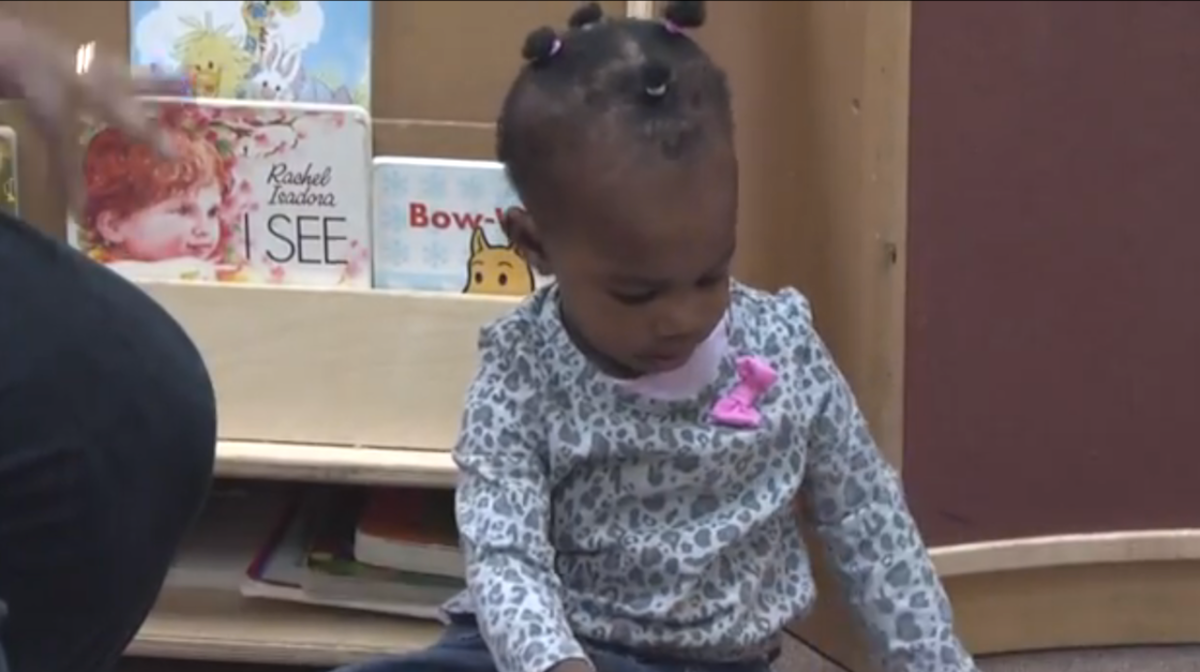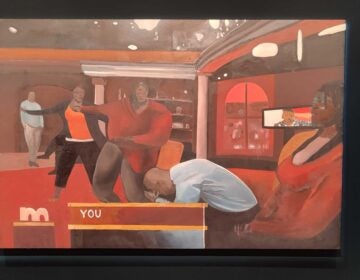Inside a four-star day-care center in Germantown

Child Space Too, which enrolls about 30 children from infants to pre-schoolers, is one of just three child-care centers in Germantown that are rated "star four," the highest for quality in Pennsylvania's Keystone STAR rating system. (Courtesy of Germantown Beat)
This is the final story in a four-part Germantown Beat series about the “child-care crisis in Philadelphia.”
A one-year-old snuggles up under the protective arm of her teacher as circle time begins in the toddler room.
The child has a binky in her mouth and dry tears line her face. But soon, her eyes light up as the 10 children in the circle sing the “Itsy Bitsy Spider” and the “Alphabet Song.”
One girl bounces and slaps her hand against a tambourine.
“More! More! Again!” the children yell.
Welcome to Child Space Too, a highly acclaimed day-care center at 5517 Greene St. in the heart of Philadelphia’s Germantown neighborhood.
The center, which enrolls about 30 children from infants to pre-schoolers, is one of just three child-care centers in Germantown that are rated “star four,” the highest for quality in Pennsylvania’s Keystone STAR rating system.
Most of the area’s more than 90 centers are rated one or two — or do not take part in the voluntary star-rating system.
Quality staff is key
Unlike centers that emphasize rote learning, Child Space Too’s approach holds that young children learn primarily through play, and that having professionally trained teachers is the key to success.
“The cornerstone of all quality is having a quality staff,” said Mindy Barbakoff, center director.
Tifanee Rider, a staff member who works in the infant room, cycled through teaching jobs at four other day care centers before she found Child Space Too last July.
“This center is exceptionally better,” she said.
Although she doesn’t have a bachelor’s degree, Rider is currently studying behavior, health and human services at community college. She is passionate about gaining the advanced skills to pursue her dream.
“I want to work with children with behavioral issues,” she said. Such ongoing education is required for all staff at Child Space Too.
A workers’ cooperative
The Child Space organization began 25 years ago, initially formed by three women who established the first day care center in Philadelphia’s Mt. Airy neighborhood.
Child Space Too is the second of three day care centers within the organization, with the third (Child Space West) located in West Philadelphia.
The centers opened as worker co-ops to empower women, Barbakoff explained. Since women were underpaid, the women who opened the center got more say in running the business. They made sure it was a quality place to work, and also a quality space for children to learn.
“We believe that children learn through play,” Barbakoff said. “The motto is that we provide quality child care.”
Through play and social interaction, Child Space Too encourages children to be active from the time they walk in the door in the morning until they leave in the late afternoon.
Rider said she enjoys watching the infants and toddlers learning puzzles and trying to manipulate them. But the most valuable learning, she said, comes during circle time when children pick up linguistic and socialization skills naturally by having fun together rather than by sitting in neat rows and memorizing letters and words.
Rider welcomes the Child Space model as compared to the center where she used to work.
Upper management, she recalled, was constantly pressuring teachers to improve students’ traditional academic skills, such as learning words.
“The upper really gave you a hard time,” she said. “I have small children [of my own], and I felt like I had to choose between my job and my kids. The expectations were unrealistic. I was blamed if the upper staff didn’t feel the kids were learning.”
Better training and pay for teachers
Many of the teachers at Child Space Too have gained knowledge from personal experience as parents themselves.
Rider, for instance, is a mother of two — a 10-year-old and a two-year-old.
However, the center makes sure its teachers supplement their personal experience with academic training.
Teachers must have a Child Development Associate (CDA) degree and 120 hours of training, requirements that exceed state standards. Not all of the teachers at the center have such degrees, but those who don’t, like Rider, are taking classes that will eventually lead to a degree.
Teachers’ salaries depend on qualifications and seniority at the center. They can be paid anywhere from $11 an hour and up. In addition, lead teachers get two weeks paid vacation, 12 sick days, four personal days and paid-days when the center is closed. The closure time includes the week between Christmas and New Years Day.
Teachers can also get health care or childcare with a 20-percent copay. Assistant teachers have similar benefits, except they only get one week of vacation time, which increases with years of service to five extra days per five years.
Low-income families welcome
Child Space Too is located near the commercial hub of Germantown, a predominantly black, working-class neighborhood of some 46,000 people. It accepts all comers, including children from low-income families who qualify for a government subsidy.
“We’ll accept anyone who comes in,” Barbakoff said. “Parents have to feel that this is a place to fit into their philosophical beliefs.”
As in many other city neighborhoods, street crime is a concern in Germantown. Located in front of an elementary school playground and next to a dentist’s office, Child Space Too is just inches from the street.
“We’ve had some vandalism,” Barbakoff admitted.
Neighborhood kids, she said, have broken into a shed out back, stolen toys on the playground, dumped sand out of a sandbox and once made off with a toy cottage. She blamed the problems on bored teenagers.
“The best defense,” she said, “is a good offense.”
Consequently, Child Space Too trains its staff to be hypervigilant, always aware of where the children are and what they are doing. Apart from petty vandalism, there have been no serious incidents involving children or staff.
Currently, 29 students are enrolled at Child Space Too, which has five open spaces reserved for children who will be moving up to the next class level. There is one family on the waiting list.
A day in the life
A visit to the center shows the children to be happy, engaged and supported by teachers who nurture their curiosity about the world.
“I did it! I did it!” exclaimed Autumn, a two-year-old in the toddler room, after putting her painting smock on all by herself.
After finishing circle time, the kids sat patiently around a table as brown paper was placed on the surface. Sticking their hands in the paint, the children smeared their fingers on white sheets of paper, making art to bring home.
“What does the paint feel like?” a teacher asks the children. “Can you name the colors?”
The children also have journal time to practice writing and drawing.
Every Tuesday, they walk to the library where the librarian reads to them.
Every other week, “Mr. Andy” comes in and plays music.
And then, there are health and safety lessons about the importance of washing your hands and how to use the fire escapes.
The center’s philosophy is to treat each child as an individual.
“Wherever they start off, we move them along,” Barbakoff said. “Children grow and develop at their own pace. They do things that are developmentally appropriate behavior.”
High marks from parents
Whatever Child Space Too is doing, it seems to please not only officials at Pennsylvania’s Keystone STAR program, but also the center’s parents.
“It’s a pretty good day care to me,” said Geeta Badeau, mother of Nicole McQuillar, a three-year-old enrolled in the Headstart program that operates out of Child Space.
There are 17 spots in the program, which prepares children for their upcoming elementary school years.
Badeau, who lives in the Mt. Airy neighborhood, was on her way to the doctor when she noticed the sign for Child Space Too on Greene Street.
“I looked and saw the sign saying they offered pre-K,” she said. “It’s closer to my home, and she is learning a lot here.”
Lianne McCluskey is a La Salle University student who writes for GermantownBeat, a local student-produced news site. NewsWorks features articles from GermantownBeat on its Northwest Philadelphia community sites and contributes multimedia journalism training to the program. Madeline Haaga, Joe Tressa and Michea Bryant also contributed reporting for this story.
WHYY is your source for fact-based, in-depth journalism and information. As a nonprofit organization, we rely on financial support from readers like you. Please give today.




